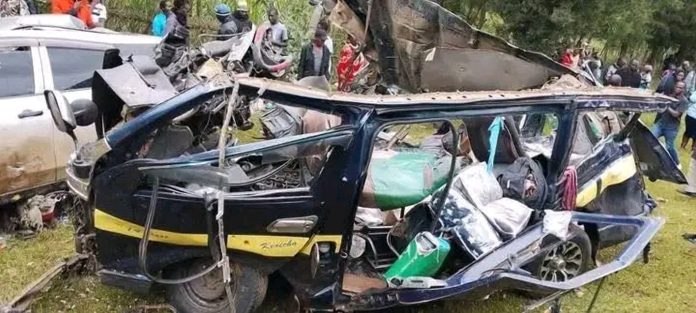On the April 4, 2025, 15 people lost their lives following a deadly road accident along the Litein-Kaplong road. The accident involved a lorry, a saloon car and a 14-seater matatu, with the matatu accounting for the majority of the casualties.
This was the latest in what has become an unfortunate, common occurrence: Kenyans traveling using public service vehicles popularly known as matatus losing their lives. The rising cases raise various questions: Is it the roads? Is it road indiscipline by matatu drivers? Is it the vehicles?
In one take, Kenyan David Kiprono has argued that the vehicles used as matatus are not fit to operate as passenger vehicles. He reasons that these vehicles, a majority of which are second hand Toyota Hiace vans were built for the purpose of carrying cargo, but are imported into Kenya and fabricated for passenger services.
Mr. Kiprono lays out his argument as follows:
“The matatus on our roads are cargo vans modified to carry people. Profit over human dignity. I know it’s fetching and controversial but hatutaishi ki-third world for the rest of our lives. We have to progress at some point bwana!
I begin by extending our heartfelt condolences to the families, friends, and communities affected by the tragic accident that occurred yesterday along the Litein–Kaplong road. The heartbreaking news of over 13 lives lost has shaken the nation, and our thoughts and prayers go out to every household now grappling with unbearable grief. The mangled wreckage from the scene tells a grim story…while a trailer and a small Nissan sedan were involved, the most devastating loss of life came from a matatu that was part of the collision.
This tragedy is yet another painful reminder of an uncomfortable truth we have long ignored: many of the public service vehicles operating on our highways were never designed to carry human beings in the first place. The matatu in question… like so many others across the country… is likely one of the many Nissan or Toyota vans originally manufactured as cargo vehicles, imported into Kenya without any passenger seats, and then crudely converted into passenger vehicles at local garages.
Kenyan Emily Kanini Rhoda arrested smuggling Sh270 million cocaine in India
This practice must come to an end. Vehicles like the Toyota Hiace or Nissan Urvan are not designed to carry people. They are meant for goods… their structural design, safety features, and crash integrity are suited for cargo logistics, not human survival. But in Kenya, they are fitted with locally fabricated seats, often installed without adherence to safety standards. No airbags, no crash testing, no emergency exits… only hope and prayers every time they hit the road.
The consequences have been deadly. Fatal accident statistics show that these locally modified vans account for some of the highest mass-casualty incidents on our roads. The truth is clear: these vehicles are not safe for long-distance or high-speed highway transport.
Compare this to factory-built passenger minibuses like the Toyota Coaster, which come equipped with reinforced frames, seat belts, properly installed seats, and emergency escape features. These are vehicles designed for human safety… crash-tested and certified for transporting people. They are engineered to protect, not just to carry.
Yes, this will be a hard pill to swallow for many transport investors. Business people will oppose this shift, arguing it will increase costs, reduce profits, or threaten livelihoods. But no profit is worth more than a single life. The cost of inaction is paid in funerals, hospital bills, and children growing up without parents.
It is time for a policy shift. The Kenya Bureau of Standards (KEBS), the National Transport and Safety Authority (NTSA), and Parliament must work together to pass a bill that stops the licensing of locally converted cargo vans as PSVs for national and transnational highways. Such vehicles may still be used for short inner-city routes or feeder roads where speeds are controlled and distances are short. But they do not belong on our high-speed roads.
Just as we’ve seen with imaginary car races… where drivers of different vehicle capabilities recklessly compete without realizing the danger… we must stop this dangerous competition in the public transport sector. A cargo van is not equal to a passenger minibus, just as a bicycle is not equal to a bus. The races we’re running… for profit, status, or convenience… are costing us innocent lives.
Let’s change course. Let us honour the lives lost not only with flowers and tears, but with bold decisions and strong action. Let us demand better for our people… safer vehicles, higher standards, and a transport system that values life above all else.”









